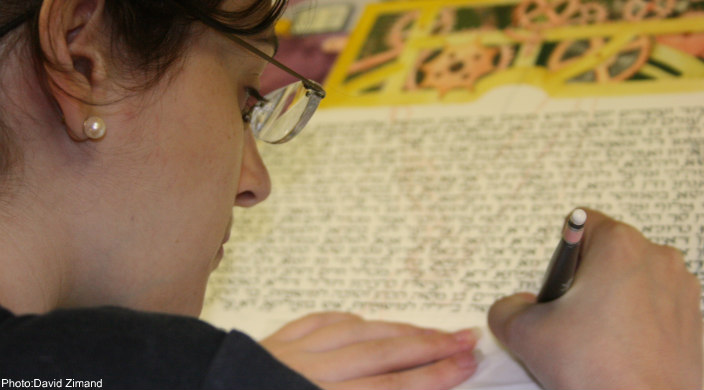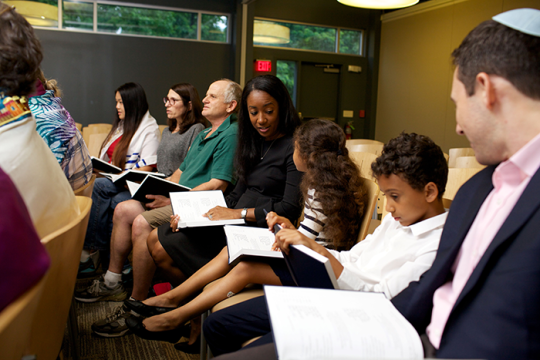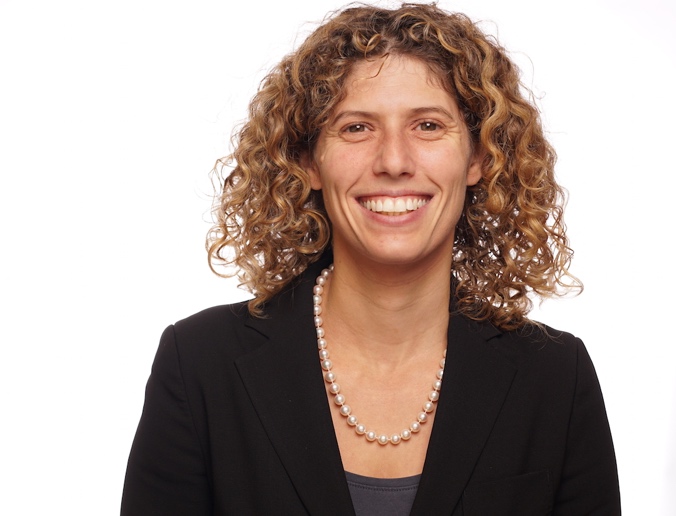
"We have the privilege and the burden of recovering the divine words reverberating behind the silences in the text, recreating women's understandings of revelation throughout Jewish history." From "Contemporary Reflection," Judith Plaskow, The Torah: A Women's Commentary, p. 423
I first inquired about becoming a soferet (scribe) in my first year of rabbinical school in Jerusalem. I had come into rabbinical school with the technical expertise of a printmaker and a bookmaker, and I was eager to immerse myself in all things Torah, including its physical creation. Unfortunately, even in 2008, I could not find a sofer in Jerusalem who would train a woman. Today, however, there is a growing movement of sofrot, female-identifying scribes, who are not only working behind closed doors to create and repair , mezuzot, and sifrei Torah (Torah scrolls), but who also serve as educators in the Jewish community, modeling the role of soferet for all to see, and providing a platform for some of today's most challenging questions about the continued relevance of the Torah.
In 2022, after women have served in the rabbinate for 50 years, hiring a female-identifying scribe to work within a progressive Jewish community should not be newsworthy. However, while Reform synagogues have long embraced progressive Jewish worship and holiday observance, the movement's ritual practitioners remain traditional. For example, if a progressive Jew wants to purchase kosher meat, they will likely purchase meat slaughtered under Orthodox supervision. Similarly, when a Reform community wants to purchase or repair a sefer Torah (Torah scroll), that community would most likely hire a traditional sofer, who may not share progressive Jewish values. How can we, as Reform Jews, seek out ritual practitioners whose relationship to contemporary Judaism aligns with ours?
This was the question that the senior staff and clergy team at Temple Beth Shalom in Needham, MA asked this year, as they began an 18-month journey to create a new sefer Torah with their community. When exploring the options for scribes, Rachel Happel, Senior Director of Learning and Engagement, suggested they look into Stam Scribes, a collective of progressive Jewish scribes.
It was through Stam Scribes that the Temple Beth Shalom team connected with soferet Ariela Housman, a long-time scribal artist. However, this commission would be her first sefer Torah. Happel and her colleagues immediately recognized the opportunity for a meaningful process of co-creation, both soferet and temple leadership were creating a new scroll and rebuilding their community during the second year of the COVID pandemic. Housman spoke about the intentional participatory experience that she and her colleagues offer to their clients. Rather than understanding their job as transactional, this community of sofrot view the technical task of writing a sefer Torah as merely one part of a communal process of modeling, teaching, and engaging. "It's an eye-opening experience to see a woman as a cultural authority, and to make [Torah] accessible to people in that way. Torah is for everyone."
Housman also discussed how writing the text of the Torah as a female-identifying scribe is different, particularly when writing passages that are disturbing for the contemporary reader. "You confront [the passage] in a really immediate way that I haven't experienced in any other context … that can be extremely uncomfortable … The Torah is not an easy book [to grapple with], particularly as someone who lives in a patriarchal society as a woman."
While a scribe's job is not to interpret the words of the sacred text, Housman openly wrestles with the content of the Torah, even as she commits to writing every word. Speaking about the Torah, she feels that "there is still a lot here to be engaged with, to learn from and interrogate."
As we celebrate Simchat Torah and begin the cycle of reading the Torah anew, we are reminded that God's voice transmitted the Torah in a way that each person could receive it, according to their own abilities and gifts, age, or gender. Furthermore, we believe that the experience of revelation did not simply occur once but is an ongoing process in every generation. As we begin the Torah cycle anew, may we each strive to commit ourselves to the sacred obligation to recall and pass on the words of our tradition, using our individual gifts and abilities to build a sacred community.
Related Posts

Crossing the Bridge from the Particular to the Universal

18 Jewish Reads for Tweens and Young Adults

